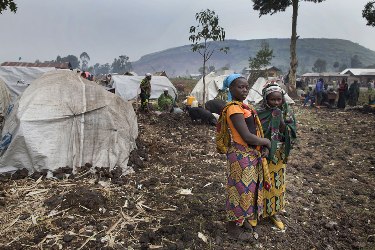
A rebel militia captured Goma, the main city in resource-rich Eastern Congo, with little resistance from the Congolese army or U.N. peacekeepers. Reports indicate the M23 rebels are pillaging and raping as scores of people flee from their homes.
U.N. Security Council members unanimously adopted a resolution (see text) late on Tuesday condemning the mutineers, demanding they leave Goma and imposing sanctions on the rebels. Despite evidence that Rwanda is involved in the rebellion, the United States refused to name Kigali as the main supporter of the mutineers. It is a position Washington and some European nations have maintained since the 1994 genocide.
Still, in a compromise with France, author of the resolution on the Democratic Republic of the Congo, the document:
"Requests the Secretary-General to report in the coming days...on the allegations of external support to the M23 and expresses its readiness to take further appropriate measures on the basis of this report."
If the Council does consider naming Rwanda next year, Kigali will be in the room, having won a rotating Security Council seat.
Atrocities against civiliansSo far 50,000 people have been displaced and the aid group Oxfam fears that up to 120,000 people could have fled fighting in the last few days. U.N. spokesman Eduardo del Buey said that "reports indicate that the M23 has wounded civilians, is continuing abductions of children and women, is destroying property and is intimidating journalists and those who have attempted to resist their control."
Human Rights Watch said it documented widespread war crimes by M23 rebels, including summary executions, rapes, and forced recruitment of children.
Since May, a group of U.N. experts said M23 had recruited some 250 children and killed dozens who tried to escape. Their report, first leaked to Reuters, said Rwanda's defense minister, James Kabarebe, was commanding the rebels in eastern Congo. The mutineers were being armed by Rwanda and to a lesser extent, Uganda.
Separately, Human Rights Watch said it established that the Rwandan army had regularly provided significant military support to the M23, including overseeing operational planning, providing weapons and ammunition, recruiting at least 600 people in Rwanda to fight for the M23, training new recruits, and deploying Rwandan army troops to eastern Congo in direct support of M23 rebels.
Said Philip Bolopion, the U.N. director for Human Rights Watch:
"If the Security Council is to protect civilians in Goma, it needs to send a clearer message to Kigali. Despite its influence on Rwanda, in public the U.S. government has been inexplicably silent. For the sake of Goma's population, the U.S. should support urgent sanctions against the M23's foreign backers."
M23, which had been integrated into the Congolese army -- but with its units intact -- has only a few thousand fighters. The Congolese army failed to stop them and the United Nations had some 1,600 peacekeepers in the area.
The peacekeeping mission, known as MONUSCO, has 20,000 troops scattered over the Congo. But they are not supposed to fight in a civil war, are to support the Congolese army and protect civilians. How this is supposed to happen without engaging in combat is one of the mysteries of their mandate.
Rwanda and Uganda have repeatedly denied the charges and said dialogue was the only way to solve the crisis. They are not totally wrong. Negotiations had been on the verge of starting but Congo President Joseph Kabila refused to recognize M23 as an interlocutor and clashes broke out near Goma.
The presidents of both countries and the Democratic Republic of the Congo are to meet shortly.
Déjà VuFighting in the Congo broke out after the Rwanda genocide in 1994 when extremist Hutus killed more than 800,000 Tutsis and moderate Hutus. Many Hutus, with France's help, fled to the Congo and Rwanda chased them saying its security was threatened.
The conflict repeated itself 1998 and in 2004 and in 2008. By then, U.N. expert reports said the real goal of Rwanda and Uganda was to extract minerals, including gold copper, tungsten -- and coltan, used in mobile phones. Goma is a major processing point for the minerals.
In 1998, a U.N. report that said the plunder developed into "systematic and systemic exploitation," mainly by Rwanda, Uganda and their allies. They organized extraction of minerals, taxation in areas under their control and monopolies to corner markets.
On the government side, the sprawling Congo has rarely been under the control of Kinshasa, in the far west of the country. It is far too large, with colonial Belgium's borders drawn irrespective of native ethnic groups.
But it's too late to change that. But maybe peace will prevail if the lack of the coltan metal stops the chimes in our cell phones.
 Camp on the outskirts of Goma; MONUSCO/Sylvain Liechti
Camp on the outskirts of Goma; MONUSCO/Sylvain Liechti
